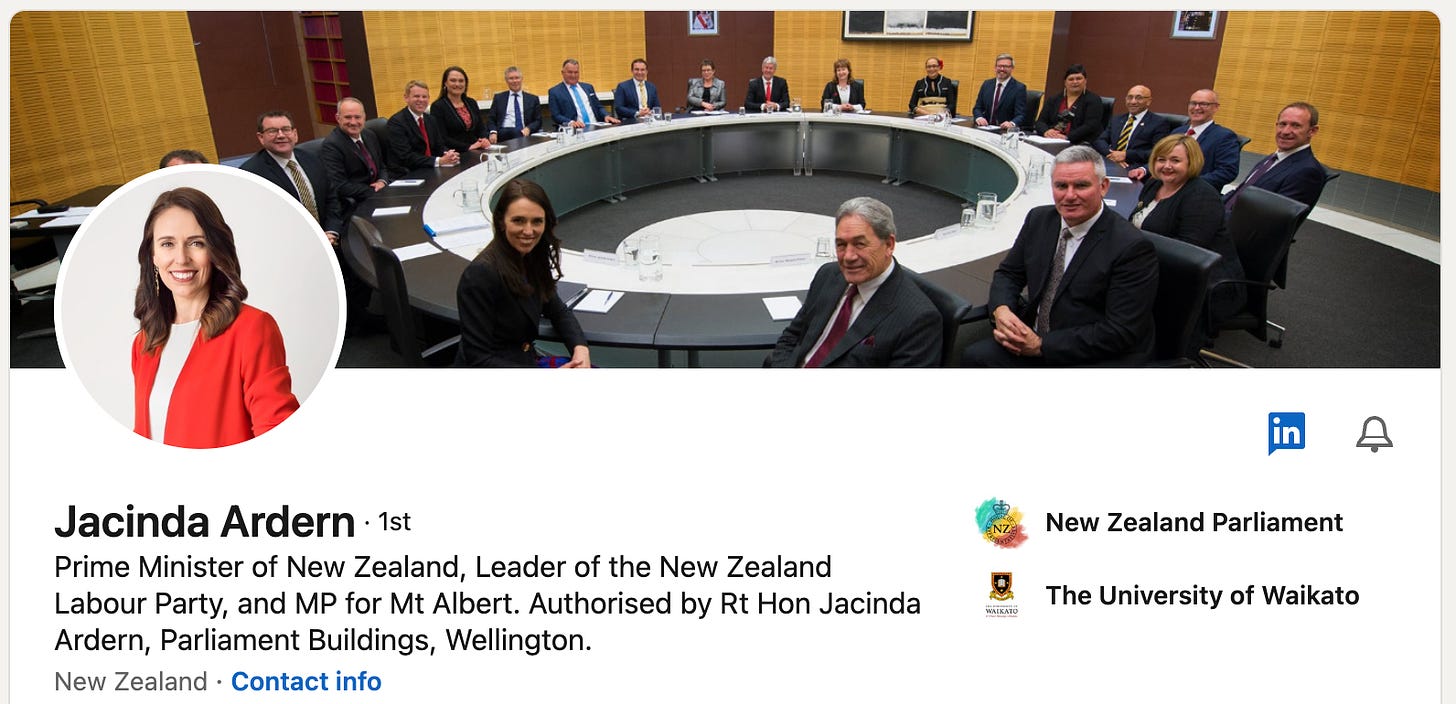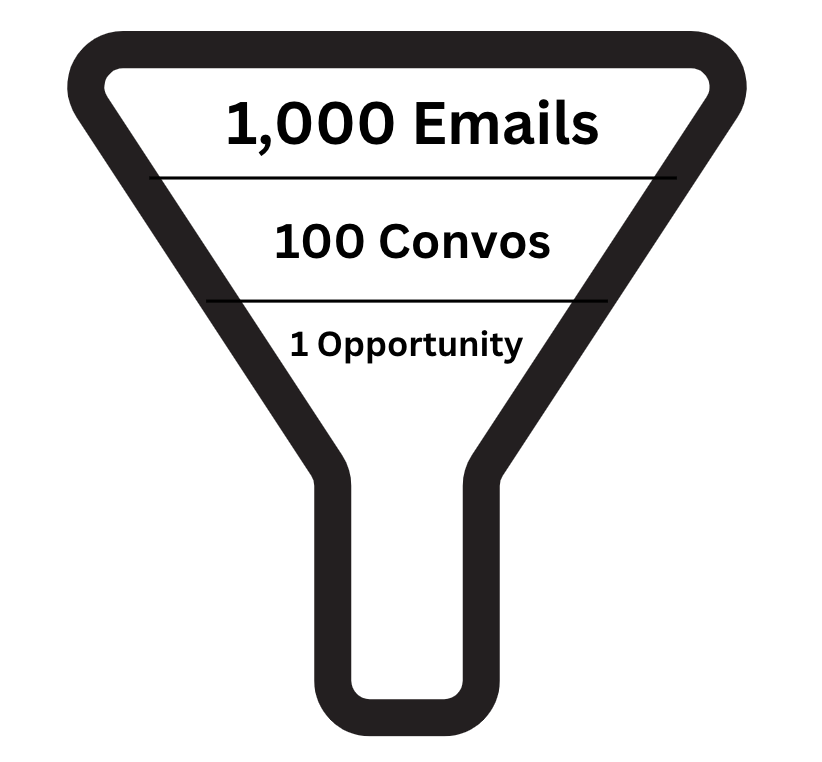This is a weekly newsletter about the art and science of building and investing in tech companies. To receive Investing 101 in your inbox each week, subscribe here:
In 2017, I was working at a fund where (for whatever reason) we lumped company coverage for every company in Australia and New Zealand into one category, and I happened to cover that category. I was spending time thinking about unique ways to hear about companies in those geos, and I stumbled upon the Linkedin profile for Jacinda Ardern, who had recently become Prime Minister of New Zealand.
First off, I'm not sure I appreciated what a prime minster was (or that it was important), and second off, she didn't become more well-known globally until September 2018 when she made history bringing her newborn baby daughter to the UN.
So, not really appreciating who she was, I decided to shoot her a message about our interest in investing in New Zealand entrepreneurs, and ended up having a conversation with the Prime Minister of New Zealand. Fun fact.
Creating a Network With Brute Force
Now, other than one conversation, and a few referrals to Economic Development agencies, I can't say that having chatted with New Zealand's PM has really done much for me professionally. But the broader lesson is to appreciate how much access you can get to people that you might not expect. Often it comes down to just being willing to ask.
That's common advice I give to folks, whether its founders looking for early customers or advisors, or people looking to find a great tech job. I thought I'd put down some thoughts, and then share some of the best resources I've seen for improving the quality of your outreach.
A Numbers Game
In the last week I've had the same conversation three different times: someone young, and hungry in their career is looking for a role at a great startup. What company should they go work for? I've had a similar conversation with two people who are looking to break into venture, and trying to figure out how best to do it. Finally, I talked to one founder who is trying to do a LOT of customer discovery. How do they talk to the right people?
Across the board, my advice is that it's a numbers game. Putting in the work to have a wide variety of conversations will almost always lead to success, but people just don't really want to do that. The rough numbers that I throw out are: if you want to get [1] good opportunity (job, customer, etc.), you need to have [100] conversations with relevant people, and that will come from [1,000] emails or warm intros to similarly relevant people.
Take the example of finding a job at a startup.
First? Narrow your aperture.
Decide what kinds of industries you're interested in, what geographies you want to be in, what roles you want to have. The bigger your aperture, the easier it is to find relevant people. But you want to be cautious of having too big an aperture (e.g. "I want to work at any tech company anywhere in the world") because that decreases your odds of being able to successfully "talk the talk" with so many different kinds of companies.
Second? Make your list.
Once you've narrowed your focus, make a spreadsheet of all the companies that fit your criteria. Then make a list of the people at those companies that have roles you might be interested in. Be exhaustive; you’ve got to identify 1,000 attempts at connecting with people.
Third? Find the way in.
As you identify the people that are in areas you're excited about, you can start to look for warm intros. Who do you know that knows these people? If all else fails, you can turn to a well-written and thoughtful cold email.
Then? You just start pounding the pavement. Looking for lots of warm intros, and sending lots of cold emails. You need to hit [1,000] attempts at getting in touch with people you're trying to connect with.
A 10% conversion rate from reaching out to having a conversation might be high, or just right, depending on how good your warm intros / cold emails / online vibes are.
The Two Questions
Once you start having conversations with relevant design partners / future employers, the most important element is preparation. Making sure you're going in prepared to talk about what's interesting to them, and focusing on "what can I do for you?" If it's a startup job, make it clear that your focus is on working with them independent of everything else. If it's a venture job, know what each firm is interested in. If you're a founder talking to customers, focus on empathy and understanding "what problem is most top of mind for you?"
You also want to avoid desperation in these conversations. These conversations are a way to build relationships whether they lead to a customer / job or not, and should avoid feeling transactional at all costs. One way to do that? Avoid asking for a job in that conversation, if you can help it. Focus on building a relationship and what you can do for them. You want to make it clear that your primary focus is on meeting great people, and then indicate your openness to working together.
As you get into these conversations, there are two questions that you'll want to always ask, and then be very systematic about tracking the answers:
Who are two other people in this space that you think highly of? If you know them, I'd love introductions, but I'm happy to reach out directly as well.
What are two companies you think most highly of? If you know them, I'd love introductions, but I'm happy to reach out directly as well.
If you do a good enough job of asking these questions, and keeping track of the answers you'll start to see a compounding effect. First? You landed 100 conversations, and they each gave you two people to talk to. That's 200 more people. Each person may not mention a unique people every time. Several of the people you meet might recommend the same person, so it's 200 data points, even if it's not 200 unique people.
The second question yields a similar data set. You now have ~200 data points of great companies (probably some of them were mentioned more than once). Now you have a list of great companies to consider working at, investing, in, or what have you. As that data set grows, you can even offer insights from it as value-add in future conversations. You know some of these companies are interesting, because someone else has vouched for them.
Increased Odds
I feel strongly, every time I offer that advice, to make the wager that 99% of people who engaged in that data-set gathering activity will have an opportunity they're excited about after talking to 100+ people. The reality is, very few people want to have 100 conversations, let alone send 1,000 emails.
One of the ways you can improve the odds of a successful outcome, are by paying attention to some of the best advice out there on how to reach out to people cold. I've included a couple examples below:



Building a Vibe
All of this has been about the process for reaching out when you've got something to reach out about. The most important thing to do, far in advance of needing to reach out, is to communicate your vibe online. Writing, tweeting, making videos or doing podcasts. My biggest struggle with creating content online was feeling like it would just be shouting into the void. But when you start having lots of these conversations, you realize that these conversations get easier when you have a body of work to communicate your interests and perspectives, in hopes of attracting like-minded people.
I would argue that there is almost no job, role, or career, that wouldn't benefit from you knowing more people than you do. Having more people to bounce ideas off than you do. Having more nodes in your decentralized brain to tap into. Spending the time to get good at this approach to building a network of people you know, adding value to their life, and focusing on what's on their mind, and nurturing those conversations from casual catchups to real-life relationships.
Thanks for reading! Subscribe here to receive Investing 101 in your inbox each week:







Great post, Kyle! Folks probably dont realize it from the outside, but this is perhaps the most important skill for succeeding in VC.